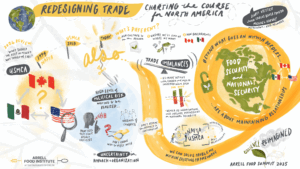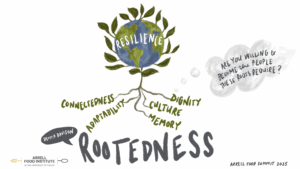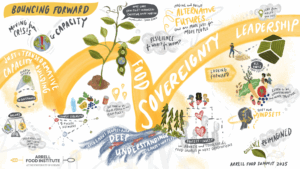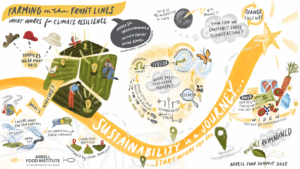2025 Arrell Food Summit
Resilience Reimagined: Redesigning Food Systems for a Changed World
Arrell Food Institute was proud to host the eighth annual Arrell Food Summit at the Globe and Mail Centre on October 21st, 2025.
Continue reading to explore highlights and outcomes of the 2025 Summit.
“To build resilient food systems for the future, technology must act as an enabler — helping farmers make more informed decisions. It’s not only about designing smarter systems, but about building meaningful ones.”
-Hamed Hamedien
Summit Snapshot
Read the official Summary Report of the Arrell Food Summit 2025. This high-level overview explores the boldest ideas and critical conversations that defined the Summit as we collectively addressed how to reimagine resilience.
“Over the past decade, Canada has fallen from third in investment in agri-food technology to tenth. I find this really surprising because when you look at Canadian agriculture, we have so much going for it.”
-Lisa Ashton
Morning Sessions
The morning sessions of the Arrell Food Summit 2025 highlighted a powerful, interconnected theme: the North American food system is at a critical juncture where community-led innovation is mandatory for achieving both economic resilience and social justice.
Discussions on global trade addressed the high-stakes USMCA review, positioning the agricultural sector not merely as a commodity, but as a significant economic lever requiring an innovative approach to policy and supply chain design. The most profound themes, however, centered on community resilience, moving decisively away from top-down, charity-based models. Sessions on food resilience and Indigenous foodways stressed that true capacity-building involves radical systems transformation, a clear form of social innovation, by restoring belonging, honoring food sovereignty, and empowering local actors. This paradigm shift ties into economic development by advocating for community-designed solutions that support local economies, build capacity over dependency, and uplift Indigenous communities with products desired in global markets (like wild rice and buffalo). The Presentation of the Arrell Global Food Innovation Award highlighted that genuine entrepreneurship is central to food security and must be rooted in community wisdom, specifically by supporting place-based and women-led enterprises. Across all panels, the message was uniform: systemic barriers must be uprooted, rhetoric must be matched by action, and foresight must replace crisis response to ensure a future food system that is equitable, adaptable, and rooted in the wisdom and agency of the communities it serves.
Read more about the morning sessions:

Redesigning Trade: Charting the Course for North America
The upcoming 2026 review of the United States-Mexico-Canada Agreement (USMCA), against the backdrop of lingering tariff disputes, will be a defining moment for the region’s economic future. In this panel, moderated by Kate Helmore of the Globe and Mail, addressed the complex interplay of these factors, from the reshaping of continental supply chains to the political pressures influencing policy.
The panelists brought international perspectives to an unpacking of the intricacies of the USMCA, focused on the opportunities and challenges faced by the Canadian agricultural sector. The participants emphasized the importance of public input through the channels that are currently open if the sector expects to see change. As Canada approaches trade negotiations, we need to raise agricultural voices now to demonstrate the impacts and potential strengths the sector offers. Multiple accounts outlined that there is not easy alternative to the export partnerships with the US, and while agriculture may not be in the headlines it can be a significant lever in demonstrating the economic benefits of a more reciprocal and open trade relationship within North America.
Session Resources: USMCA | Canada Consultation Call Out | US Public Consultation | Mexico Public Consultation

Rooted Resilience: Securing a Global Food Future from the Ground Up
North America’s charity-based approach to food insecurity often reinforces cycles of dependency and disempowerment. As Devita Davison pointed out, true resilience “isn’t about surviving, it’s about maintaining your humanity while you do it”. That is why community-rooted food systems that center equity, cultural relevance and relational resilience are so important.
In her keynote presentation, Devita argued the building of food systems for “scale” has obscured context, prioritized corporate power and has created brittle systems that are unable to adapt today’s complex problems. She offered insights into how building community-rooted food systems regenerates, supports local economies, builds capacity not dependency, and connects communities. She called on us to restore belonging within our food systems as infrastructure for true resilience and to be brave enough to be the people to uproot the systems that serve corporations over community.
Keynote Resources: Karen Washingtons – Food Apartheid | Monica White – Freedom Farming | Angela Davis – Abolition | Leah Penniman – Soul Fire Farms

Bouncing Forward: Moving from Crisis to Capacity
The rising frequency of climate shocks, pandemics, and supply chain disruptions has exposed the limits of a “bounce back” approach to food system resilience. This session demonstrates why resilience must mean transformation, by examining how to “bounce forward”.
Panelists framed adversity as a catalyst for change and explored proactive capacity building: strategies that strengthen core systems before disruption strikes and shift thinking from crisis response to foresight and prevention. Building on that foundation, the discussion turned to transformation in practice. Speakers emphasized cross-sectoral collaboration among governments, Indigenous communities, academics, and food organizations to tackle food insecurity and structural inequities. Examples highlighted included Indigenous-led agreements linking ecosystem protection with economic development, national efforts expanding food bank capacity, and continental strategies prioritizing resilience in Africa. Together, these insights underscored that leadership means breaking silos, fostering trust, and committing to shared goals that advance sustainability, justice, and food sovereignty.
Session Resources: Great Bear Rainforest Agreement | Hunger Count Report | A 10-year Parliamentary call to action for agri-food systems transformation in Africa

Indigenous Foodways: A Fireside Chat
This fireside chat capitalized on the national momentum of the NCIAF (National Circle for Indigenous Agriculture & Food) to seek the ‘how and the why’ of sustainable agri-food practices. A call to action to the thought leaders in the room to change Canada’s food story. Addressing systemic barriers and social inequity around food access, incarceration, and child welfare, the discussion focused on two key questions: How can we change Canada’s food story to uplift communities with products desired in global markets, such as wild rice and buffalo, and what are food system leaders currently doing to facilitate that change?
A key message is that community-led solutions need to be given a platform. This cannot be another situation where Indigenous communities are given someone else’s solution to carry out. Instead, trust, system and policy change, must combine to empower solutions designed by communities to address their challenges and not a ‘one size fits all’ approach. This empowerment not only builds internal community value but also drives a more complete understanding of Canada’s food production for domestic resilience and international trade.
Session Resources: NCIAF Website | Cowessess First Nation: Building a Bright Future Through Agriculture | NCIAF Youtube Channel

Presentation of the Arrell Global Food Innovation Award
At this year’s Summit, Laura Arrell presented the Arrell Global Food Innovation Award to Irene Etyang of MAMLO FOODS. Awards adjudicators Janet Dean and Abra Brynne joined Irene in a conversation exploring the enterprise in driving change, the connection between community and economy, and the value of women-led businesses in shaping sustainable food systems.
In her acceptance speech, Irene spoke to the importance of empowering local producers by creating opportunities for value-added production within the supply chain. She shared that growing up in Teso, she saw “communities rich in food knowledge, Indigenous food knowledge and wisdom but often overlooked by systems,” and emphasized that lasting change comes when we nurture what’s already within us: “The people, the land, and our knowledge, the Indigenous food knowledge.” The conversation that followed emphasized that innovation and entrepreneurship are essential for both food security and sovereignty, and that supporting place-based enterprises can create meaningful social and economic impact.
Awardee Resources: MAMLO FOODS Website | MAMLO LinkedIn | MAMLO Instagram
“Communities already have the answers. Your job isn’t to save anyone. It’s to show up with humility, ask what you need, resource it, amplify it and get your ego out of the way.”
-Devita Davison
2025 Arrell Food Summit Visual Notes
Our inhouse Creative Advisor, Alex Sawatzky, works at the intersection of research, art, and design, fostering relationships that co-create and mobilize knowledge. Over the course of the 2025 Arrell Food Summit Sawatzky listened to different sessions and has completed visual notes based on different sessions. Scroll through to see her designs from the summit.




“If we want truly sustainable food systems, we need convergence across social, economic, and environmental goals. That means accepting some risk, protecting consumers, and recognizing the right to healthy food through genuine collaboration.”
-Renée Michaud
Afternoon Sessions
The afternoon sessions detailed the critical pathways to implementing and scaling the morning’s themes, underscoring that innovation must be the engine of growth across all levels of the food system.
Discussions around The Million Acre Challenge demonstrated that large-scale corporate initiatives rely on cross-sector collaboration and long-term investment to achieve regenerative agriculture at scale. Further, the session on The Next Generation of Growth (referencing the recent RBC report) emphasized that the Canadian innovation ecosystem is struggling and requires targeted investment to support emerging leaders and boost agri-food entrepreneurship. Insights from Farming on the Front Lines: What Works for Climate Resilience confirmed that producers are already driving practical innovation against climate change. Fully realizing the potential, sessions Ag-Tech Stories and Retooling for Resilience, highlighted that policies should reward risk-taking, break down data silos, and prioritize human-centered technology.

The Million Acre Challenge – a Conversation with Galen Weston
This panel highlighted the critical role of large corporations in shaping the future of Canada’s food system. Through a conversation between Evan Fraser and Galen Weston, the discussion explored how corporate leadership and a long-term vision can influence sustainability, innovation, and regenerative agriculture at scale.
The conversation introduced the Million Acre Challenge, a $50 million Weston Family Foundation initiative supporting the acceleration of large-scale regenerative agriculture in Ontario. Galen Weston emphasized the importance of designing for scale, reducing risk for farmers, and building collaboration across the food value chain to drive meaningful, lasting change.
Session Resources: Million Acre Challenge | CANZA Website | Homegrown Innovation Challenge

Farming on the Front Lines: What Works for Climate Resilience
The escalating pressures of climate change, from extreme weather to shifting seasons, are demanding a fundamental reimagining of our agricultural systems. This panel spotlighted the lived experiences, ingenuity, and practical solutions that producers are developing every day to adapt to a volatile climate, offering insight into what’s working on the farm, where additional support is needed, and the barriers that remain.
Panelists shared a range of strategies being used to strengthen resilience, including drainage tile, cover cropping, winter wheat rotations, and the use of statistical AI to accelerate learning. Participants highlighted the importance of knowledge sharing combined with local data to develop context-specific solutions as well as the need to support the early adopters leading sustainable practices. The conversation emphasized that agriculture transformation is an ongoing process shaped by collaboration, incremental progress, and long-term commitment. Looking ahead, producers called for continued investment that provides both financial resources and opportunities to learn, experiment, and take ownership of their own transformation, ensuring they can adapt and thrive in an increasingly unpredictable climate.
Session Resources: GFO – Program Guide for Sustainability

The Next Generation of Growth
This segment featured Lisa Ashton, Director of Agriculture Policy at RBC Thought Leadership, in conversation with University of Guelph President Rene Van Acker. The discussion focused on strengthening Canada’s agricultural innovation ecosystem and support emerging leaders driving sustainable growth in the sector. This conversation highlights the urgent need to address declining investment, talent, and innovation while shaping solutions for the next generation of leaders.
Ashton discussed RBC’s recent research in partnership with the Arrell Food Institute, which found that Canada has fallen from third to tenth in agri-food technology investment over the past decade. She highlighted concerning trends in declining talent, research diversity, and commercialization, emphasizing the need for renewed cross-sector collaboration. Ashton also described RBC’s new $5 million “RBC Generate” initiative, designed to invest in the next generation of agriculture by supporting market, finance, and skills development through partnerships like SF4C. Reflecting on her own experience with the Arrell Food Institute, she credited real-world learning opportunities for shaping her leadership in policy and communication. She reaffirmed that agriculture remains Canada’s “moonshot” for economic growth and sustainability, with productivity and innovation at the core of that vision.
Session Resources: Next Generation of Growth Report | Education at AFI | RBC Generate Initiative | SF4C Website

Ag-Tech Stories
Ag-tech is a gateway into a critical, but often underestimated collision between emerging technologies like AI and a sector that represents a significant percentage of Canada’s GDP. Innovation in this sector is driven by small and medium-sized enterprises (SMEs) and entrepreneurs, and while success is often tracked by economic indicators, the human element drives the sector forward. Four of these new leaders shared their story through photos of their work, their journey, and brief interviews on stage. From sensor and farm management software to increased shelf stability through innovative packaging processes, the breadth of technology is united by the system that drives Canada’s innovation ecosystem.
Across all sessions, founders emphasized that innovation in agri-food must start with human needs and community context, not technology alone. A shift toward science-driven solutions that reduce waste, energy use, and environmental impact while improving access to nutritious food contributes to a shared vision for resilient, decentralized food systems that empower farmers and communities. Ag-tech is leading toward a future where local production and global innovation intersect: creating food systems that are equitable, adaptive, and grounded in community.
Ag-Tech Stories Guests:

Retooling for Resilience
As ag-tech innovations accelerated, the focus shifts from what technology could do to what it meant for the people behind the work. Automation, AI, and data-driven tools promise efficiency and growth, but also raised critical challenges around workforce readiness, job creation, and equitable access to opportunity. The final panel examined how the sector could move beyond innovation for its own sake to ensure that emerging technologies strengthened, not sidelined, the human element at the heart of agriculture.
The panel explored what it will take to scale innovation across Canada’s food system, emphasizing that technology alone isn’t enough; collaboration, trust, and smart policy are key. Speakers highlighted the need to break down data silos, co-develop solutions with farmers and policymakers, and build transparent, human-centered AI. They called for policies that reward responsible risk-taking and investment in rural innovation, noting that, like the clean energy transition, sustainable food systems will scale when economic, social, and environmental incentives align.
“Decades are much more important to us than quarters. And when you look at decades, social trends, environmental trends, and demographic trends, these are all things that predict the future of the businesses that we are in. And so having a view of where they’re going and making business related decisions in the face of those things matters a lot.”
-Galen Weston
Join Our Network
Stay up to date on the latest Arrell Food Institute events, opportunities, research and agri-food insights.
Attend an AFI Event Near You
AFI brings together food system actors to develop big ideas that will create safe, healthy and sustainable food systems for all. In bringing together contributors from across the continuum of food and food production for important and challenging conversations, AFI builds networks, mobilizes meaningful change and supports the sustainable, safe and reliable future of food.